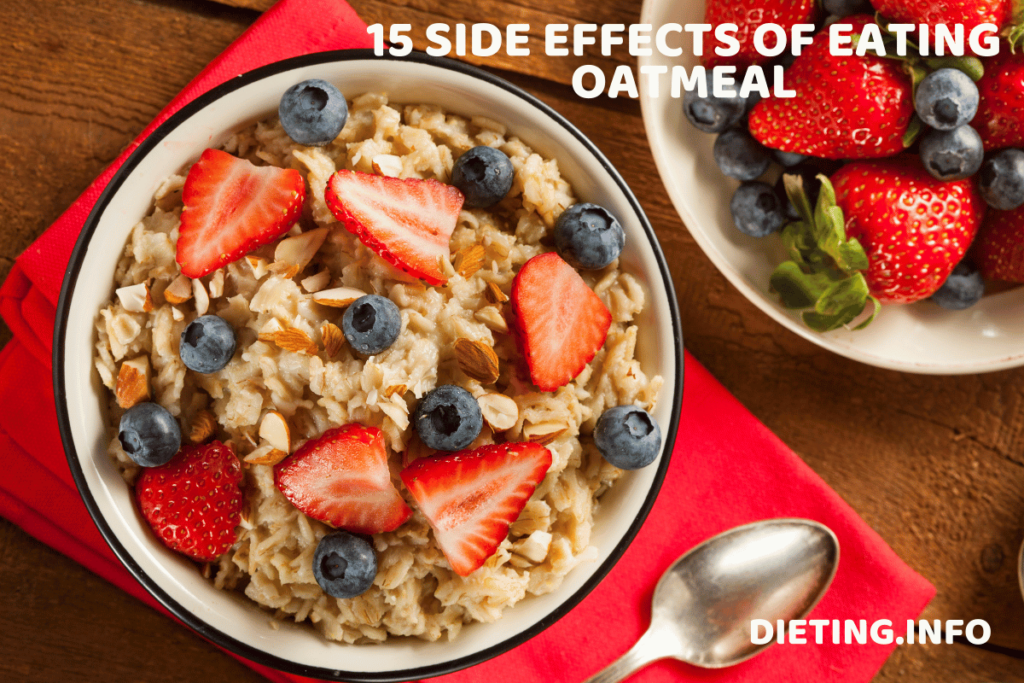
Side Effects of Eating Oatmeal: Oatmeal has long been revered as a breakfast champion, lauded for its heart-healthy benefits, high fiber content, and its ability to keep us satiated through the morning rush. It’s the go-to option for anyone looking to kickstart their day in a nutritious way. However, even the most healthful foods can have their downsides when consumed in excess or not suited to individual health needs. Despite oatmeal’s sterling reputation, there are several side effects that might surprise you. Let’s explore the less-discussed aspects of consuming oatmeal and how they might impact your well-being.
Side Effects of Eating Oatmeal
1. Bloating and Gas
The high fiber in oatmeal is fantastic for your digestive system, but it can also lead to bloating and gas, especially if your body isn’t accustomed to such a fiber-rich diet. This discomfort is usually temporary as your digestive system adjusts.
2. Unwanted Weight Gain
Yes, oatmeal can help in weight loss due to its fiber content keeping you full. However, the toppings and sweeteners many people add (think brown sugar, maple syrup, or chocolate chips) significantly increase the calorie count, potentially leading to weight gain.
3. Nutrient Absorption Issues
Oats contain phytic acid, which can bind minerals like iron and zinc, hindering their absorption. This is particularly noteworthy for those relying heavily on plant-based diets, where maximizing nutrient absorption is key.
4. Gluten Cross-Contamination
While oats inherently don’t contain gluten, they are often processed in facilities that handle wheat, barley, and rye, leading to cross-contamination. For those with celiac disease or gluten sensitivity, this can be a major concern, necessitating the choice of certified gluten-free oats.
5. Avenin Sensitivity
A minority of individuals with gluten sensitivity or celiac disease might also react to avenin, a protein in oats, which can trigger similar symptoms to those caused by gluten.
6. Gastrointestinal Discomfort
Apart from bloating and gas, some people may experience either constipation or diarrhea when consuming oats, depending on their body’s reaction to the fiber content.
7. Spike in Blood Sugar Levels
Instant oatmeal varieties, often laden with sugars and having a higher glycemic index, can cause a quick spike in blood sugar levels, which is less than ideal for individuals managing diabetes.
8. Overconsumption Hazards
The ease and comfort of preparing oatmeal might lead to overconsumption, where its benefits turn into liabilities, including excess calorie intake and fiber overload, leading to digestive issues.
9. Possible Allergic Reactions
Though rare, some people might be allergic to oats themselves, experiencing symptoms ranging from mild (such as hives) to severe (such as anaphylaxis).
10. Effects on Thyroid Function
Consumed in very large amounts, the goitrogens in oats can interfere with thyroid gland function, particularly concerning for those with existing thyroid issues.
11. Difficulty in Weight Management
Oats are generally beneficial for weight management, but misjudging portion sizes and underestimating caloric intake from add-ins can hinder weight loss efforts.
12. Reduced Appetite Control
While the fiber in oats is meant to keep you full, overeating oatmeal, especially when it’s flavored or sweetened, can disrupt natural appetite control mechanisms, leading to more frequent hunger pangs.
13. Increased Risk of Heart Disease
Ironically, excessive consumption of certain types of oatmeal, especially those high in sugars and low in fiber, can contribute to the very heart issues they’re often eaten to prevent.
14. Discomfort from Additives
Pre-packaged oatmeal options might contain artificial flavors, colors, and preservatives that can cause discomfort or allergic reactions in sensitive individuals.
15. Economic Costs
While not a health side effect, the financial cost of purchasing specialty oat products, especially organic or gluten-free options, can add up, making oatmeal a less economical choice for some.
Making Oatmeal Work for You
Despite these potential side effects, oatmeal remains a nutritious and versatile option for many. The key is moderation and awareness. Opt for whole, minimally processed oats and be mindful of portion sizes and toppings. For those with specific dietary concerns, such as gluten sensitivity, seeking out certified gluten-free oats and monitoring your body’s response to oat consumption is crucial. Always remember, the best diet is one that is balanced, varied, and tailored to your individual health needs.
In sum, oatmeal can still be the hero of your breakfast table, provided you navigate its consumption with knowledge and mindfulness. By doing so, you ensure that this superfood works for you, not against you, in your journey toward optimal health.